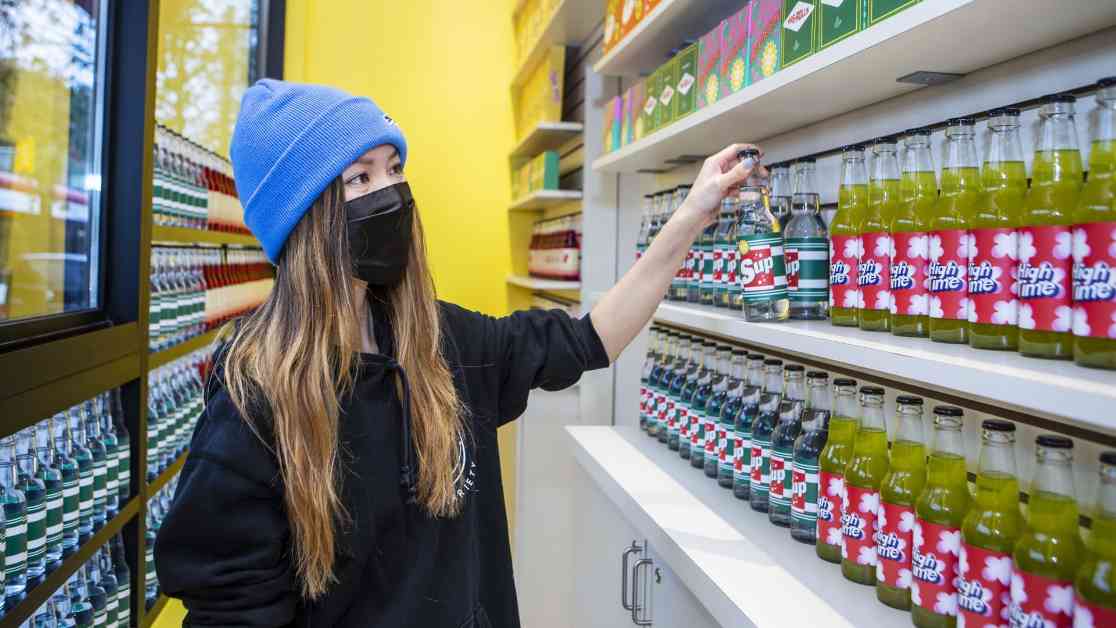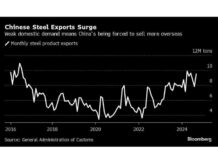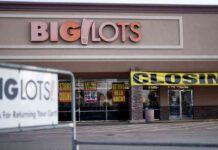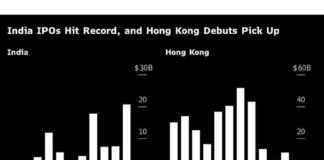The trend of non-alcoholic drinks is on the rise as more Americans are looking for healthier alternatives to traditional alcoholic beverages. With a focus on promoting health benefits, beverage makers are capitalizing on this growing demand for functional beverages that go beyond hydration or nostalgic tastes.
The Shift Towards Non-Alcoholic Drinks
Mimi Lam, co-founder and CEO of Superette, is at the forefront of this trend, arranging cannabis-infused beverages at the Superette Sip ‘N’ Smoke cannabis dispensary in Toronto, Canada. According to recent figures from data insights company NCSolutions, more than 40% of Americans are trying to drink less alcohol, up from 34% the previous year. This shift is even more pronounced among Generation Z, with 61% of them planning to consume less alcohol in 2024 compared to 40% in 2023.
As younger consumers become more health conscious and older generations seek healthier options, interest in non-alcoholic drinks has surged. Sherry Frey, a wellness expert at Nielsen IQ, notes that this trend has fueled the rise of functional beverages that offer specific health and cognitive benefits beyond mere hydration or taste.
The Rise of Functional Beverages
Functional beverages are gaining popularity worldwide, with the global market expected to reach $249.5 billion by 2026. In the U.S. alone, retail sales of functional beverages topped $9 billion in the 52 weeks ending March 30, according to NielsenIQ. These beverages often include adaptogens, herbs marketed for their health benefits, and mood-altering substances like THC, the psychoactive component in cannabis.
The pandemic further accelerated the popularity of functional beverages, leading to their proliferation in grocery stores, restaurants, and bars. Consumers are drawn to these drinks for their potential health benefits, including higher energy levels, improved digestive and brain health, and mood enhancement.
The Impact on Consumer Behavior
While the growth of functional beverages does not signal the end of alcohol consumption, it reflects a shift in consumer preferences. According to BCG, around 80% of those who purchase non-alcoholic beverages also buy alcoholic drinks. This indicates a desire for more choices and alternatives to traditional alcoholic beverages.
Younger consumers, in particular, are driving the trend towards functional drinks. Gen Z has the lowest penetration of alcoholic beverages among all generations, highlighting a preference for healthier options. However, it remains to be seen whether this trend is a lasting shift or a product of the pandemic, which limited socializing opportunities with alcohol.
Consumer Focus on Health and Wellness
Consumer interest in health and wellness has surged during the pandemic and continues to be a top priority. Nielsen data shows that consumers are increasingly seeking products that offer multiple benefits, such as improved health and taste. Functional beverages that promote general well-being and specific health benefits are particularly popular among consumers.
Drinks that provide energy, digestive health, and mood enhancement are in high demand, reflecting a shift towards holistic wellness. Consumers are looking for products that not only taste good but also offer functional benefits, creating added value for their consumption experience.
In a survey by Datassential, three-quarters of respondents believed that functional foods and beverages could help them live longer and healthier without drastic changes to their diet. This indicates a growing interest in products that offer both taste and health benefits.
The Evolution of Functional Beverages
With the rise of functional beverages, there has been a proliferation of products that cater to different consumer needs. Companies like Hop Wtr have developed adaptogenic beer alternatives that provide relaxation without the negative health effects of alcohol. These drinks contain adaptogens and nootropics that are claimed to reduce stress, anxiety, and fatigue while improving mood and focus.
Similarly, Hekate, a sober bar in New York City, offers a range of alcohol-free options for consumers looking to socialize without alcohol. The bar has seen a diverse clientele, ranging from older locals to university students, highlighting the appeal of non-alcoholic alternatives in social settings.
While functional beverages offer a potentially healthier substitute for alcohol, they also serve as alternatives to sugary sodas. Consumers are increasingly wary of sugar content in beverages and are turning to functional drinks as a healthier option.
The Legal and Safety Concerns
Despite the health benefits promoted by beverage makers, the functional beverage industry faces legal challenges and safety concerns. Claims made by companies about the health benefits of their products are not always subject to FDA review, raising questions about their accuracy and validity.
For example, Poppi, a functional soda brand, is currently facing a lawsuit challenging its claims of digestive benefits. While the company stands behind its product, the lawsuit underscores the need for greater scrutiny and regulation in the functional beverage market.
As the industry grows, safety questions around ingredients and health claims will need to be addressed. Ensuring the safety and efficacy of functional beverages will be crucial for maintaining consumer trust and confidence in these products.
The Rise of Cannabis Drinks
One area of growth in the functional beverage market is cannabis-infused drinks, which offer a unique alternative to traditional alcoholic beverages. Companies like Cann and Brez have seen success in catering to consumers looking for a true alcohol alternative that provides both taste and effects.
Cannabis drinks allow consumers to consume THC and CBD in controlled doses, similar to alcohol or coffee. This controlled consumption model appeals to both cannabis users and non-users, offering a way to enjoy the benefits of cannabis without the drawbacks of traditional consumption methods.
As cannabis legalization expands, the market for cannabis drinks is expected to grow significantly. Companies like Cann have seen substantial growth in sales and distribution, indicating a strong consumer demand for cannabis-infused beverages.
In conclusion, the rise of non-alcoholic drinks and functional beverages reflects a growing consumer interest in health and wellness. With a focus on promoting health benefits and offering alternatives to traditional alcoholic beverages, beverage makers are tapping into a lucrative market. As the industry continues to evolve, addressing legal and safety concerns will be essential for ensuring the long-term success of functional beverages.






















